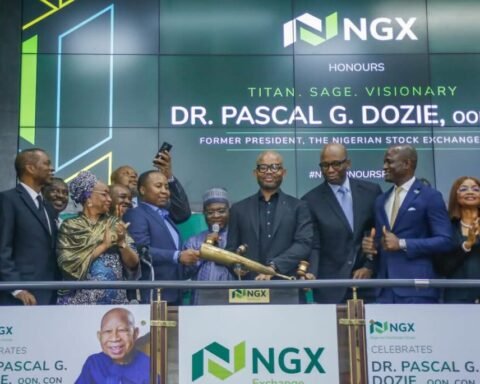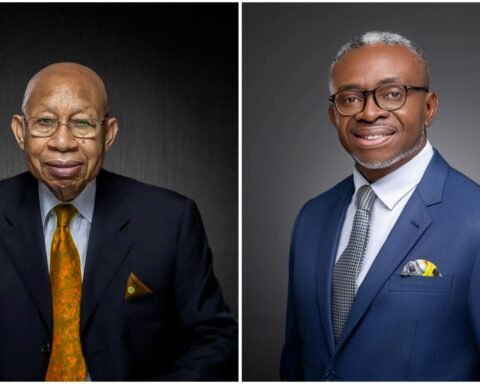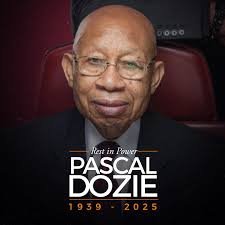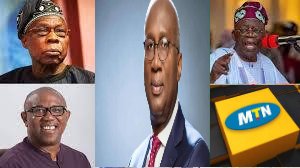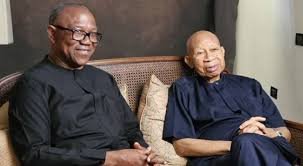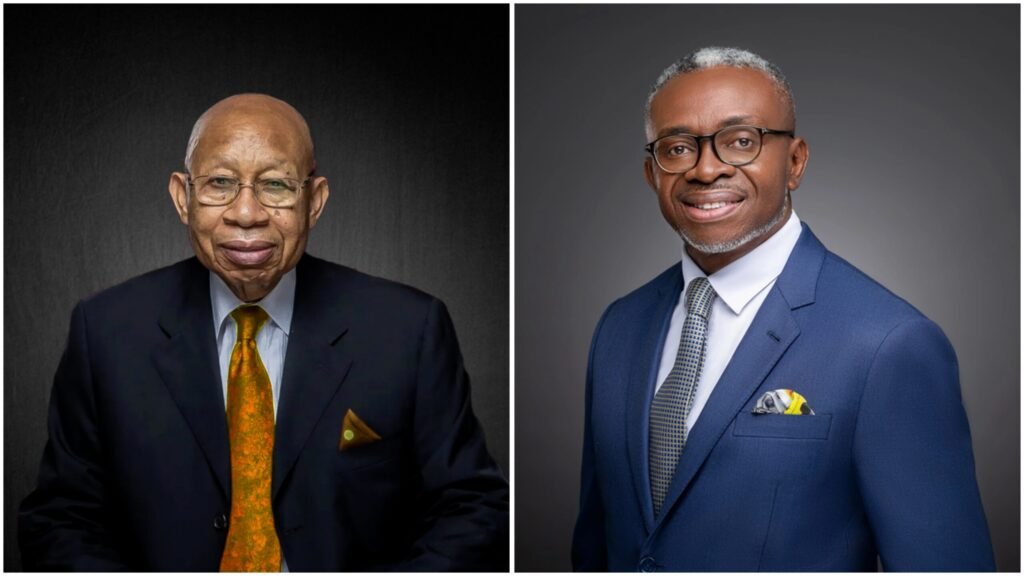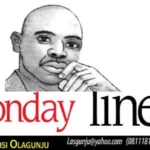By Faith Omoboye
IN the story of modern Nigerian enterprise, few names resonate as deeply as Pascal Dozie — a man whose journey from a small village in Owerri to the apex of corporate Nigeria reads like a masterclass in resilience, vision, and audacity.
Dozie was more than just a pioneer banker or respected boardroom strategist. He is a patriarch of modern entrepreneurship, an early believer in Nigeria’s economic potential at a time when few dared to invest in its promise. From founding Diamond Bank to playing an important role in bringing MTN to Nigeria, his fingerprints are found at the very roots of the nation’s most transformative economic chapters.

From Egbu to London
Born on April 9, 1939, in Egbu village, Owerri, Pascal Gabriel Dozie was raised in a devout Catholic household by his father, Charles Dozie, a catechist. His academic brilliance soon became evident. After completing his secondary education at Holy Ghost College, Owerri, he left post-war Nigeria to study economics at the prestigious London School of Economics.
Not stopping there, he earned a Master’s degree in Administrative Science from City University, London, with a focus on Operational Research and Industrial Engineering—a rare blend of skills that would later define his career.

Young Pascal Dozie
The global professional with local roots
Dozie’s career began in the UK, working as an economist at the National Economic Development Office and lecturing part-time at North Western Polytechnic. In the early 1970s, he was invited to Uganda as a consulting economist for the African States Consulting Organisation, working closely with the civilian government of President Milton Obote.
But a sudden military coup led by General Idi Amin upended his life, forcing him to flee the country. Instead of heading to the U.S. as initially planned, he returned to Nigeria at his mother’s insistence. It was a fateful decision—one that would sow the seeds for his entrepreneurial legacy.
A new start in Lagos
Nigeria, still reeling from the effects of the Biafran War, Dozie and his young family lived modestly with relatives in Lagos. “My first objective was survival,” he once recounted. He founded Africa Development Consulting Group (ADCG), working long hours, chasing contracts, and leaning on his wife, Chinyere, for administrative support.
Though the startup phase was grueling, his hard work began to pay off. ADCG secured high-profile clients like Pfizer and Nestlé, cementing Dozie’s reputation in Nigeria’s fledgling consulting space.
His expertise attracted the attention of Clement Isong, then Governor of the Central Bank of Nigeria, who engaged him to conduct studies on the Co-operative and Commerce Bank. It was the first of many boardroom calls that would shape Nigeria’s economic landscape.
“My first objective was survival and of course, I had an ambition. You set up a company, you want that company to grow; you want it to be robust and profitable. Being in consulting was a tricky affair because you have a lot of receivables. It was a hustle job. A hustle to get payment and a hustle to do the job all the time,” he would later recount.

Diamond in the rough: A bank is born
In 1985, Dozie was appointed chairman of the now-defunct Progress Bank. But it was the same year that he saw a deeper problem—and a business opportunity. Traders in southeastern Nigeria were vulnerable, forced to carry large amounts of cash due to the fragmented nature of banking.
“There was no central server,” Dozie explained. “If you had an account in Aba, you couldn’t withdraw in Lagos.”
“So we came up with the first DIBS (Diamond Bank Integrated Banking System) which eliminated the need to carry cash when trying to perform a transaction. All you needed was to prepare your cheque and when you arrive at your destination, you get your cash.A year or two later, we came out with a payment card which led to value card. The rest, they say,is history”
He envisioned a solution – a tech-forward bank designed to empower commerce and reduce risk. After a five-year process of meeting Central Bank requirements, Diamond Bank was born in 1991. It launched with just ₦10 million in capital and 21 shareholders.
“When we set up Diamond bank, it became technologically driven right from the word go because we wanted to change the system and eradicate the delay in making transactions,” he shared in an interview.
From one branch on Victoria Island, the bank would grow into a nationwide powerhouse under Dozie’s leadership. Always a champion of innovation, he positioned Diamond Bank as a pioneer of banking technology – a decision that set it apart in an increasingly competitive sector. He was CEO of Diamond Bank from 1991 to 2006 when he handed over to his son Uzoma Dozie.

A bold bet on MTN Nigeria
One of Dozie’s most celebrated moves came in the early 2000s, when South Africa’s MTN Group sought to enter the Nigerian telecoms market. They needed a local partner to fund 40% of the venture. Many Nigerian investors balked at the idea -NITEL had failed, so why would MTN succeed?
But Dozie saw potential where others saw risk. He convinced a few trusted allies to invest, raising 20% of the required funds. MTN South Africa covered the rest. Today, MTN Nigeria is the country’s largest telecom provider, and Dozie’s decision is hailed as one of the smartest investment calls in the country’s business history.
“During that period, my name came out in every newspaper, saying I belonged to several groups and boards which was illegal. So MTN wrote me a letter saying that “we don’t want to have anything to do with you again because you belong to a lot of groups” . I said “thank you very much” and they left. I still have the letter they sent to me which I didn’t reply to. I have not destroyed the letter because there are some things in a man’s life you don’t destroy.”
“After a while, MTN came back to me saying they were sorry for accusing me wrongly after they found out that the people I asked to work with me were the ones who tried to tarnish my relationship with MTN. This is because they wanted to be Chairman.”
“Fortunately, then-Chairman of MTN was going back to South Africa with the Chief Executive of one of the competing groups and she asked, “How did you find this man called Pascal Dozie? He is everywhere and part of many groups.” The man answered and said he had never seen, met or spoken to me before,” he shared in an interview.
“Most of the people I asked to invest now regret not investing—I even regret it myself. They would have enjoyed returns of 20 times their money,” he said.
Dozie also served as chair of the board of Johnnic West Africa, a special purpose vehicle set up with a large South African company group that held a 59.6 percent equity in BusinessDay Nigeria.

A life of leadership
Dozie’s impact on Nigeria’s economic landscape extends far beyond the walls of Diamond Bank and MTN. Over the decades, he has become a trusted steward of some of the nation’s most influential institutions, shaping policy, governance, and corporate strategy with a steady hand and an eye on the future.
He once served as the President of the Nigerian Stock Exchange, a role that placed him at the center of Nigeria’s capital markets during a period of reform and expansion. From 2001 to 2019, he chaired the board of MTN Nigeria, overseeing its transformation into the country’s leading telecom provider and one of Africa’s most valuable companies.
His commitment to national development was evident in his tenure as Chairman of the Nigerian Economic Summit Group, where he helped guide policy dialogue between the public and private sectors. He also served as a Director at the Central Bank of Nigeria, contributing to monetary policy during critical periods in the nation’s financial evolution.
On the international front, Dozie co-chaired the Commonwealth Business Council, positioning Nigerian business interests within the broader framework of global commerce. At home, he continued to shape education and enterprise as Chairman of Kunoch Ltd and Pan-Atlantic University, both institutions committed to excellence and innovation.
A passionate believer in the power of private capital to unlock Africa’s potential, Dozie is a founding partner of Africa Capital Alliance, a private equity firm dedicated to funding high-growth businesses across the continent.
Honours and Legacy
For his exceptional service to Nigeria’s economy and society, Pascal Dozie has received some of Nigeria’s highest honours. He is a recipient of both the Commander of the Order of the Niger, CON, and Officer of the Order of the Niger, OON – distinctions reserved for those who have rendered outstanding contributions to the country.
His work has also been recognized across the continent. In 2012, he received the Lifetime Achievement Award at the All Africa Business Leaders Awards (AABLA), a testament to the enduring impact of his leadership.

Personal life
Dozie is survived by wife Chinyere Dozie and his five sons, among other relatives,
Pascal and Chinyere Dozie
“My sons tell me I ruined their lives because I denied them the opportunity of having private lives. I say it is not my fault. I had wanted to have a daughter as my first child because I have a friend, Maxell Ubani, whom I used to admire his daughter then in the U.S. When I told him mine was coming, he would respond jokingly “You no fit get a daughter, daughters are for special people.” When I was expecting my fourth child, I hoped for a daughter and said her name would be Ngozi Pascal. When it turned out to be a boy, I said his name is still Ngozi Pascal.” he said in an interview.

Pascal Dozie and his sons
But perhaps his most lasting legacy is not found in titles or accolades, but in the many lives he’s touched—entrepreneurs he’s mentored, institutions he’s helped build, and a generation of Nigerians inspired by his unwavering belief in their potential.
.Businessday

